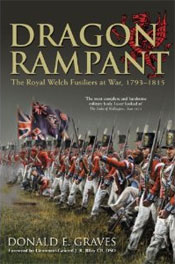
Dragon Rampant by Donald E Graves
Foreword by Lt-General Jonathon Riley CB, DSO, PHD, MA
Lt-Gen Riley - The Last Colonel of The Royal Welch Fusiliers
 Because of the scale of the two great wars of the twentieth century, the long stand-off with Communism that followed, and the turmoil since the fall of the Iron Curtain, we tend to forget the length and depth of the titanic struggle with Revolutionary and Napoleonic France that so consumed the world from 1792 to 1815. Consume the world it did - for the war was fought in a thousand places: from the wilds of North America, to the Caribbean, to Spain and the Mediterranean, to Central Europe and Russia, to India and the South China Seas. Such is the gulf of time that lies between now and then it is hard to remember that this was a life-or-death struggle, a contest from which only one set of beliefs would emerge intact. The sacrifices of those who fought in it are no less, therefore, than the sacrifices made by those who fought in any of our more recent wars.
Because of the scale of the two great wars of the twentieth century, the long stand-off with Communism that followed, and the turmoil since the fall of the Iron Curtain, we tend to forget the length and depth of the titanic struggle with Revolutionary and Napoleonic France that so consumed the world from 1792 to 1815. Consume the world it did - for the war was fought in a thousand places: from the wilds of North America, to the Caribbean, to Spain and the Mediterranean, to Central Europe and Russia, to India and the South China Seas. Such is the gulf of time that lies between now and then it is hard to remember that this was a life-or-death struggle, a contest from which only one set of beliefs would emerge intact. The sacrifices of those who fought in it are no less, therefore, than the sacrifices made by those who fought in any of our more recent wars.
This book is essentially the story of some of those who made those sacrifices - sometimes to the ultimate degree. Some have become iconic figures of folklore like the camp-follower and army wile Jenny Jones, or the fictional Thomas Atkins, or the now-neglected poetess Felicia Hemans, or the battle-scarred commanding officers like Henry Ellis and Thomas Pearson. Others just did what they had to do and, as Holy Scripture puts it, have become as though they had never been born. We are very fortunate in the archives of the Royal Welch Fusiliers to have such a wealth of historical material of this great conflict - from both the famous and the obscure. The Royal Welch Fusiliers were present at almost every major engagement fought by the British army in the European theatres of war between 1798 and 1815; it is this which makes the book possible, just as the Regiment's service in the American Revolutionary War made Mark Urban's Fusiliers possible. We are fortunate too in having been able to persuade Donald E. Graves to undertake it. With his depth of knowledge of nineteenth-century warfare and his understanding of the Regiment through his biography of the redoubtable Thomas Pearson, there is no one better able to tell the tale.
During his researches, Donald Graves has shed new light on many old problems and increased our knowledge of many things. Not least of these is the degree to which the Royal Welch Fusiliers really became a Welsh regiment during the early nineteenth century, something that had previously been thought had not happened until after 1914. We now know more, too, about the battle of Albuera - one of the bloodiest days of the British army; and about Waterloo. Not one of the greatest battles of the period - Austerlitz, Borodino, Bautzen, Leipzig were all bigger - Waterloo was by far the biggest battle experienced by the British. Because of this, and because it was decisive in that it marked the end of one period of history and the beginning of another, it left a folk memory in Britain that did not fade for a hundred years.
So whether you are a serious follower of regimental history, or a general reader of Napoleonic War history, or a scholarly researcher, or just a military buff there is something in this book for you. I thank Donald E. Graves for his wonderful work, I also thank his wife, Dianne, for being so understanding while he wrote it, and I commend Dragon Rampant with the very greatest pleasure.
Lt-Gen Jonathon Riley
Master of the Armouries, HM Tower of London
Article Copyright © 2010